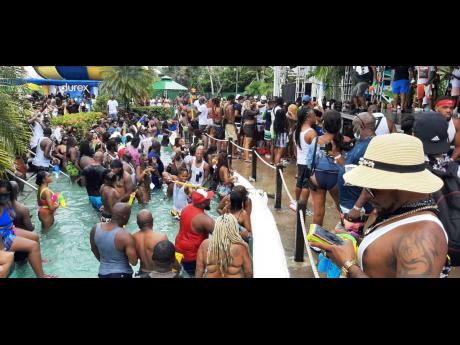U-TURN
Entertainment sector shut down, other COVID restrictions tightened
Less than seven weeks after the initial opening up of the entertainment sector, the Government has pulled the plug as the island is experiencing a third wave of COVID-19 with high levels of hospitalisations, climbing infection rates and mounting death toll.
This was among a raft of new containment measures announced by Prime Minister Andrew Holness last evening as the Government seeks to dial back runaway COVID-19 figures.
Previously, for large events, with more than 100 people in attendance, permission would have been needed from the entertainment ministry. However, on Monday night, the prime minister reversed this decision as he announced: “Nightclubs and certain places of amusement are to be closed. No small or large events, for example concerts, parties, tailgate parties, round robins, will be permitted … . .”
In addition to the closure of the entertainment industry, Holness added that the nightly curfew hours would be expanded by an hour, now starting at 7 p.m. and continuing to 5 a.m. the following day from Mondays to Fridays. On Saturdays, the curfew will begin at 6 p.m. and last until 5 a.m. on Sunday. On Sundays, the curfew will be from 2 p.m. to 5 o’clock on Monday morning.
Businesses are to close an hour before the curfew begins.
Additionally, beaches that are not under management or control are to be closed. The beaches that remain open are subjected to tighter hours – 6 a.m to 4 p.m. from Monday to Saturday, and on Sunday, from 6 a.m. to 1 p.m. Rivers will only be used for domestic purposes and rafting.
On Sunday, it was revealed that admissions at the University Hospital of the West Indies were at 100 per cent; Cornwall Regional Hospital was at 110 per cent; Spanish Town Hospital was at 160 per cent; May Pen Hospital was at 108 per cent; Mandeville Hospital was at 160 per cent; Savanna-la-Mar Hospital was 167 per cent; and St Ann’s Bay Hospital was at 135 per cent.
Holness also explained that from July 1 to 13, Jamaica recorded a daily average of 52 cases. This has skyrocketed to 238 cases daily in August. For the first eight days of August, Jamaica has recorded 1,903 new cases in comparison to 1,572 new cases for the entire month of June.
Holness also revealed that the Government could impose a no-movement day if the cases continues to increase at the current rate.
He added that the Government was not considering mandatory vaccinations as this measure would not adhere to the Constitution.
John Mahfood, president of the Jamaica Manufacturers and Exporters Association, told The Gleaner last night that he was satisfied with the new measures as he recognised the “balancing act” that the Government has to maintain.
“I thought it was a very good presentation in terms of the changes in curfew hours. I thought that is was very reasonable … . I think the presentation and information that he provided was one of the best so far. As far as I am concerned, it was necessary based on the situation we are experiencing,” Mahfood stated.
He added that he would have also wanted to see free COVID-19 testing for persons who are interested in taking the vaccine. Additionally, he suggests anyone who travels to Jamaica should be fully vaccinated as most tourists come from countries where vaccines are readily available.

